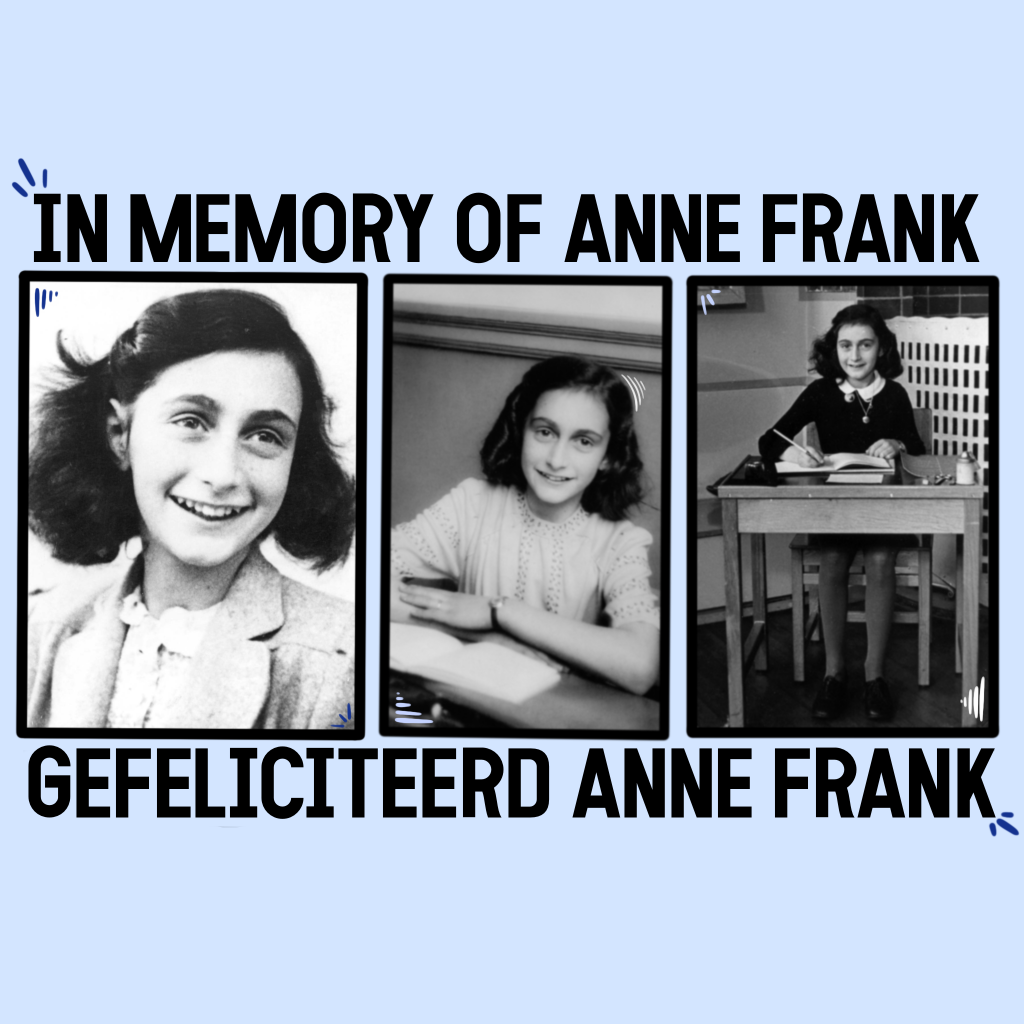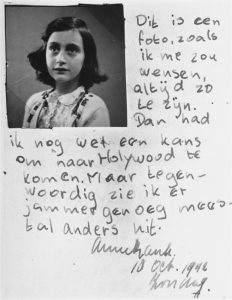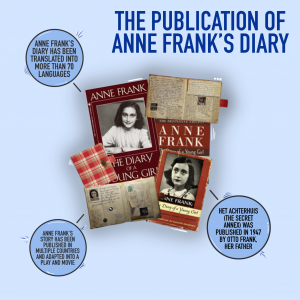Honoring Anne Frank’s Legacy
In honor of Anne Frank’s birthday, historian Adam Seipp discusses the importance of her diary and why we should continue to celebrate her contributions to history today.

By Mia Mercer ‘23

This image from the United States Holocaust Memorial Museum depicts a photo of Anne Frank and an excerpt from her diary. Today, Anne Frank’s diary is one of the most recognizable first-hand accounts of the Holocaust.
Anne Frank was only 13 years old when she and her family were forced into hiding on July 6, 1942, because they were Jewish and living in Germany. For two years, Anne recorded their life, crowded together in a cramped attic until they were ultimately discovered and seized by the Nazis. Like so many other Jews, Anne did not survive the Holocaust. But her diary did.
With over 30 million copies sold and translated into 70 different languages, Anne Frank’s diary is regarded by scholars as an incredible first-hand account of what life was like for a Jewish girl during German occupation. To honor her legacy on what would have been her 92nd birthday, historian Adam Seipp from the College of Liberal Arts discusses the importance of recognizing her work and celebrating her life.
“There is probably no account of Jewish life during the Nazi period and the Holocaust that is more widely read than Anne Frank’s,” Seipp said. “Not only should we mourn the loss of a 14-year-old girl who was murdered for absolutely no reason; we should also mourn the loss of an extraordinary literary talent. She was 12-14 when she wrote the diary and the way she wrote, her style, her thoughtfulness, the way she constructed her own story — what an extraordinary talent. People should read Anne Frank, but they should read Anne Frank in context, and understand where she fits into this much bigger story.”
The Dutch family who housed the Franks during the Holocaust returned Anne’s diary to the sole survivor of the Frank family — Anne’s father, Otto — who decided to publish it. First published in Dutch, the diary was translated into English during the early 1950s. By the mid-1950s, the book became a bestseller after it was turned into a Broadway play.
“There is a famous line from The Diary of Anne Frank that says ‘In spite of everything, I still think that people are really good at heart,’” Seipp recalled. “It’s a great line and it’s the centerpiece of the play, but it’s in the middle of the diaries. To put it bluntly, I don’t know if that’s how she felt at the end. When she wrote that, there was still hope…after being arrested, deported, forced into labor, being separated from her parents, and then dying in a camp, it’s unfortunate that that has become the sort of famous line because I don’t think that reflects the complexities of what Anne Frank went through. She was about to turn 15; she never got to. She endured a tremendous amount in the last days of her life, but I think the underlying message is, we shouldn’t read her story as an optimistic triumph of the human spirit.”
According to Seipp, first-hand accounts of the Holocaust like Anne’s not only capture the voices of those who didn’t survive; they also provide a way to educate future generations about their terrible experiences. Anne Frank’s diary, Seipp said, is a great example of this.

Anne Frank’s diary has an interesting history. Although many people recognize it as a first-hand account of the Holocaust, Seipp warns that we shouldn’t confuse her story with the general story of the Holocaust.
“[Anne Frank’s diaries] are very visceral,” Seipp shared. “When students encounter Anne Frank’s diaries, they encounter a very immediate and very human source in a way that statistics and photographs of terrified people being loaded onto trains just don’t capture.”
However, even though Anne Frank’s diary is a widely used educational tool for understanding the Holocaust, Seipp stressed the importance of understanding that not all Jews encountered the same trials and tribulations as Anne and her family.
“Anne Frank was an educated, highly literate German Jew, and she was not particularly religious, while the vast majority of Jews who died in the Holocaust were Eastern European. They died where they lived, in their villages or in camps,” Seipp explained. “This doesn’t take anything away from Anne Frank’s experience, but when we think of her experience as typical, we’re missing something about the Holocaust, and that really matters. Her diary gives Americans a sense of the Holocaust that does not capture the full historical experience, so I caution my students not to confuse Anne Frank’s story with the general story of the Holocaust.”
Before going into hiding, Anne’s parents had applied for U.S. citizenship but were denied. As we mark Anne Frank’s birthday, Seipp said we should reflect on the fact that if Anne Frank had been given permission to move to the U.S., she would likely be alive today.
“If Anne Frank was alive today, it would be great to talk to her about her life, what her life was like when she came to America, what her life was like when she left Germany, and what her life was like when she was given this opportunity to be saved from murder,” Seipp said. “I would love to have seen or been part of an interview with Anne Frank, the elderly Jewish immigrant living in New York or Chicago, but that wasn’t possible because she wasn’t given the opportunity to escape or to live.”
Anne Frank’s life was tragically cut short due to the horrors of World War II and the Holocaust. However, thanks to her resilience and dedication to her diary during the last years of her life, we have a window into the Holocaust through the eyes of one girl.
“Anne Frank should continue to be celebrated today,” Seipp remarked. “She is one of the most remarkable literary witnesses to the Holocaust and she should continue to be read as widely as possible. I just want to encourage people to read her diary in the context in which it was written and published.”
